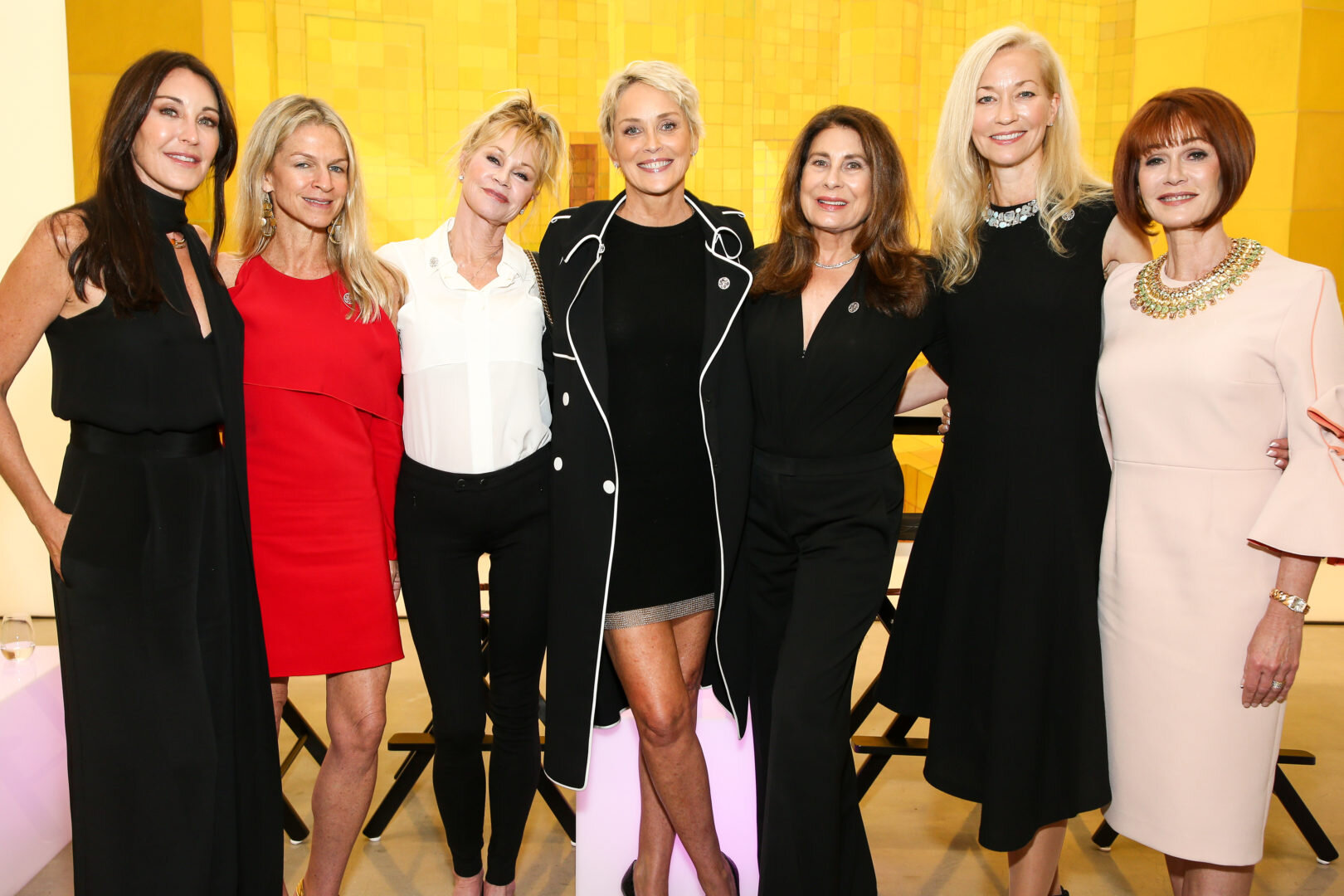Women Being Heard
by Lynn Posluns for The Huffington Post:
Sharon Stone has given stunning performances in her movie career, but none so memorable as the real-life story that she told in front of a rapt audience at the Gagosian gallery in Beverly Hills, California.
The star of Basic Instinct and Casino graciously agreed to moderate a panel of remarkable women for a discussion of brain health at a special event in support of Women’s Brain Heath Initiative, an event made possible by the sponsorship of Gagosian, Eli Lilly, AbbVie and the Brain Canada Foundation.
She was joined by another major movie star, Melanie Griffith, as well as producer Paula Wagner, Tamara Mellon, who is the co-founder of Jimmy Choo, producer Crystal Lourd and Dr. Pauline Maki, a professor of psychiatry at the University of Illinois and a prominent women’s brain health researcher.
They participated in the event for varied reasons, but the common theme was their openness, honesty and their determination.
After I gave a short talk on the mission of Women’s Brain Health Initiative and what it takes to better control your cognitive destiny, Ms. Stone led off with a powerful recounting of the harrowing experience she had in the days following 9/11.
“In 2001, I had a stroke,” she said simply. “It’s a bit like you see in the movies when Zeus hit somebody with a lightning bolt and they kind of go flying.”
It touched off a nightmarish journey through the health care system, which included firing her doctor as he was preparing to perform exploratory brain surgery on her, even while he was also negotiating an interview with People Magazine—a revelation that drew gasps from the audience.
She spoke about how doctors would not believe her. They thought she was acting.
“And when I think about what one has to go through as a woman to be heard about anything,” said Ms. Stone—an observation that had a parallel with the Harvey Weinstein scandal, which was dominating headlines around the world, but particularly in Los Angeles.
But this event was all about brain health and the special challenges facing women. The hour-long talk enthralled the intimate audience, including luminaries such as Catherine O’Hara, Rufus Wainwright and Cheryl Tiegs.
Melanie Griffith also spoke of not being believed, having had six grand mal seizures before doctors finally diagnosed her with epilepsy.
“Over a period of 20 years, no one paid enough attention to even diagnose me. Not that I’m special, but I’m in a position where I can get care and you think somebody would have done something,” she said.
Dr. Pauline Maki said that the anecdotes from Ms. Stone and Ms. Griffith are backed up by research studies that have documented a “bias in medical care”.
“It’s quantified. It’s there. A woman goes in with the same symptoms as a man and the woman will be sent home 30 per cent more often,” she said.
“It’s a human rights issue.”
She spoke about the biases in research, citing the inexplicable practice for anorexia studies, where only 7 per cent of the lab rats used were female, even though it is a disorder that overwhelmingly affects women.
Dr. Maki added that some of her most satisfying work is to train women to be scientists. She starts early, reaching out to high school girls to encourage them to consider science as a career.
“I’m glad that we’re doing it now because you know who studies women’s brain health? Women.”
The panellists, all strong, accomplished women, spoke compellingly about standing up for change and about the need to take positive action to preserve brain health.
Tamara Mellon said she refuses to deal with companies that do not have a substantial female representation in leadership positions.
Paula Wagner, whose mother had Alzheimer’s, has learned to pace herself, to limit the amount of stimuli assaulting the brain from all our various technological screens and to take respite in the company of friends.
Crystal Lourd shared that feeling, saying that it is essential to take breaks from technology and social media: “I feel so much more relaxed when I’m talking to someone rather than texting.”
They collectively spoke about the health benefits of optimism and of reducing stress.
Ms. Griffith told the audience she has not had a seizure in four years, not since she was prescribed a drug called Lamictal. She also cited positive life changes.
“I also got divorced (from Antonio Banderas), which I think was the real healer for me.”
The crowd roared with laughter.
“I’m dead serious. I mean it. I am not stressed anymore.”
Sharon Stone revealed that her stroke not only sideswiped her career, but she also lost her marriage, custody of her child and all her money.
“I know what it’s like to be top top top of your field to be wiped out,” she said.
But after a difficult 16-year journey she has prevailed.
“I now have custody of my child again, I’ve paid off my house, back in the black and several months ago I rehired managers and agents.”
It was inspiring to hear women of such accomplishment speak so frankly about the challenges they have faced and how they have overcome them.
It was also heartening to hear them remind us that, even in this youth-obsessed culture, with age comes wisdom. Paula Wagner’s observation was apt: “I would say don’t get caught up in being 25 because you’re going to be older longer than you are younger.”Source: http://bit.ly/2zi1SNNPhoto: (L-R) Tamara Mellon, Crystal Lourd, Melanie Griffith, Sharon Stone, Paula Wagner, Dr. Pauline Maki, Lynn Posluns

